
Мария Дубовикова
Мария Дубовикова - Президент и основатель IMESClub
Machiavellian tactics undermining hopes of peace in Syria
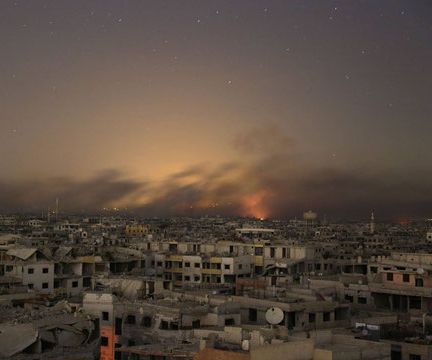 The situation in Syria is heating up, as the international powers play an expanding geopolitical game on the Syrian chessboard. The sequence and timings of recent events raise many questions. The situation in Eastern Ghouta is developing in the same way it has for the past several months without attracting much attention from the international community. However, following continuous violations of the de-escalation zone by militants, targeting residential neighborhoods in Damascus, both Russia and Syria have intensified operations in the area.
The situation in Syria is heating up, as the international powers play an expanding geopolitical game on the Syrian chessboard. The sequence and timings of recent events raise many questions. The situation in Eastern Ghouta is developing in the same way it has for the past several months without attracting much attention from the international community. However, following continuous violations of the de-escalation zone by militants, targeting residential neighborhoods in Damascus, both Russia and Syria have intensified operations in the area.
The situation is aggravated by the presence of Al-Qaeda-linked groups and militants using civilians as human shields; a common tactic in civil wars.
The media reaction was started by activists on the ground, reporting through text messages and WhatsApp about the calamitous situation in Eastern Ghouta. However, it seems nobody was paying attention to the fact that Damascus is also populated by civilians, and the constant shelling of the city is causing death and destruction. It seems as if not all lives matter to the international community.
The international coverage of Eastern Ghouta shows how biased and subjective media coverage is compared to what Afrin is undergoing at present; just because Turkey, a Western ally and a NATO member, is acting against the Kurds, whom Ankara labels as terrorists. Thus, it is apparent that the West needs Ankara right now more than Turkey needs the West. This justifies why the latter does not denounce what the Turkish army is doing in Afrin, while blaming the Russian and Syrian armies for their role in Ghouta. Turkey looks the potential winner in the tug-of-war between Russia and the West, as both need Ankara in the war against terrorism. The losers here are the Kurdish people, as they appear to be mere pawns in the geopolitical game.
The entire international community bears responsibility for the conflict as, instead of solving the crisis, all the players prefer to engage in geopolitical games using their pawns on the ground.
– Maria Dubovikova
After long debates at the United Nations Security Council, the members unanimously voted for a resolution requesting a one-month armistice in Syria. As expected, the armistice is not working. The international media reported a probable chemical attack in the suburbs, after which the UK threatened to strike Damascus, as if Western powers have the right to strike any country they want. When the British and Americans invaded Iraq in 2003 after suspecting that Iraqis were producing biological and chemical weapons and long-range missiles, the reports were proven to be false. Launching such strikes on Syria now could bring about the same result.
The UK and the US are picky in their reporting. They forget how many people have been killed in Iraq or how many were killed recently in Deir Ezzor. They channel their news coverage to serve their own interests by distorting the image of other nations.
Attempts to ease the humanitarian status have been disrupted by militants. It is common knowledge that Ghouta is suffering from starvation and illnesses, and civilians, spending most of their time in basements, want to get out from the suburb. However, the militants do not let them out, forcing families (who reach the checkpoints, seeking to leave Ghouta for safety) to return. The rebels are using the civilians in their own media game and abuse them as human shields.
British Foreign Minister Boris Johnson laid responsibility for the disastrous situation in Syria on Russia. His tone was clear, and the direction everything is now moving is becoming clear as well. It seems that American procrastination over a political settlement in Syria is aimed at partitioning the country. This violates the US-Russian agreement and thus Moscow will be forced to counter US efforts to divide Syria and will play the game until the end, including not allowing the Americans to have a base there.
Meanwhile, the risk of a clash between the US and Russia over Syria is on the rise. The consequences of such a scenario are hard to calculate, but Russia is undertaking diplomatic measures to avoid such risky developments. Moscow is calling on the Western powers to use their influence on the rebel groups. Russian demands are simple: Once the rebels stop shelling the city, the strikes will be stopped. The terrorist groups should also leave the area, as there is no way they will be accepted as a part of cease-fire talks or any agreement. Had this been achieved already, humanitarian missions could have gained access to the affected areas sooner. All of this can be achieved through international cooperation and the proper exercise of pressure on the militants on the ground.
The entire international community bears responsibility for the Syrian war, as all countries prefer to play geopolitical games instead of solving the crisis, using their pawns on the ground regardless of how many people are killed. All countries should stop being Machiavellian in their deeds and decline the motto “the end justifies the means.”
Article published in Arab News: http://www.arabnews.com/node/1263946
Middle Eastern players all talking but none are listening
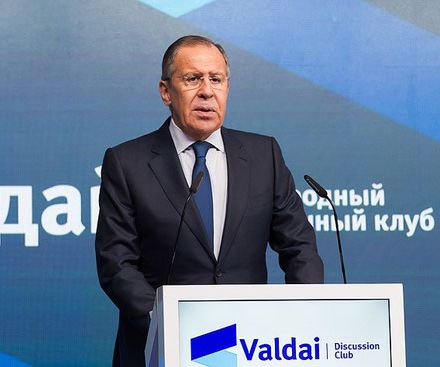 The Valdai Discussion Club — the main expert discussion platform in Russia — last week held its annual conference on the Middle East. It was the most representative Middle Eastern Valdai in history, as it was attended by two foreign ministers (Russia’s Sergey Lavrov and Iran’s Javad Zarif), the deputy foreign ministers of some Middle Eastern countries, former top-level politicians and leading experts and advisers from all over the globe.
The Valdai Discussion Club — the main expert discussion platform in Russia — last week held its annual conference on the Middle East. It was the most representative Middle Eastern Valdai in history, as it was attended by two foreign ministers (Russia’s Sergey Lavrov and Iran’s Javad Zarif), the deputy foreign ministers of some Middle Eastern countries, former top-level politicians and leading experts and advisers from all over the globe.
The conference, which was titled “Russia in the Middle East: Playing on all Fields,” focused on the major regional conflict knots like Syria, Palestine and Israel, Libya, Yemen, and Iran. Russia’s role in the settlement of these crises was discussed but was not the cornerstone of the conference.
The conclusions that can be made following the two days of debate are as follows: Russia is standing strong on its positions and is serious about its intention to settle the Syrian conflict through international institutions, alongside supportive formats like the Astana process and the Sochi congress. But Moscow is deeply concerned by the activities of the US in Syria. Lavrov, answering a question on what more Russia can do to improve the current situation, said it is not about what Russia can do but what the US should not. There is a high level of mistrust between Moscow and Washington that threatens the whole settlement process in Syria.
Russia initially blocked the United Nations Security Council resolution on a ceasefire in Ghouta, mostly because of its doubts about the intentions of the US and its allies. Russia also stood firm on the exclusion of terrorist factions, such as Al-Qaeda and Faylaq Al-Rahman, from the ceasefire. The tendency to present Al-Qaeda-linked groups as merely militants or rebels started last month and has gained momentum.
What does provide hope for the region’s future — and underlines Russia’s potential as a negotiator for peace — is that every year Valdai gathers in one hall representatives from Saudi Arabia, Iran, Israel, Palestine, Turkey, the Kurdish community, the US and others, and encourages them to talk openly.
– Maria Dubovikova
Russia is calling on the international community to work together on the Syrian conflict settlement. It will work closely on the establishment of the constitutional committee that was approved in Sochi. But it has become clear Russia will face severe problems with the Assad regime, as the declaration approved at the conference was modified by Syria — to remove the paragraph on the UN’s dominant role — with no coordination. The speech by Bashar Assad’s media adviser Bouthaina Shaaban made everyone feel that Damascus is far from understanding the real situation and is absolutely unwilling to negotiate. Russia is facing a series of problems in dealing with Damascus and this will be the main challenge to its bid to establish a constitutional committee with the UN’s support.
Meanwhile, Zarif called for peace talks and the establishment of a regional security system: A mechanism that would allow the region to openly discuss its challenges. Avoiding the topic of Tehran’s expansionist policies in the region, Zarif highlighted Iran’s readiness to cooperate and negotiate. Iran slammed Israel for its policies, backed by the US, which was not surprising, but the speeches by Israeli representatives really were different.
This can be summed up by one passage by former Israeli Foreign Minister Dore Gold, who summed up his speech regarding Israeli support for an independent Kurdistan by stating that the occupied Golan Heights are and will remain Israeli territory. Parrying the statement that such declarations violate international law, he answered that territories annexed following a war of aggression are illegal, but territories annexed as a result of a war of self-defense are a totally different story. Israel, blindly backed by the US, is getting tougher and more impudent and that will, sooner or later, have severe consequences for the regional powers. While Palestinian representatives are giving strong signals that greater Israeli oppression will only produce greater resistance, what is typical for both sides is a total unwillingness to listen to one other.
The Yemeni and Libyan conflicts have stalled. We can point to the problems and even draw ideal world solutions, but there is no chance we will succeed in implementing any of them. Russia is trying to facilitate a peace settlement in Libya after being asked by the Libyans to be more involved in the conflict, but Yemen is not its playground. On Libya, there is intense cooperation between global powers, but Yemen seems to be a forgotten war that nobody cares much about.
The speeches at the conference seem to suggest relations are degrading toward further escalations and confrontations. The problem in all these cases is like so much in the region: We are all speaking but not talking. We hear but do not listen. The Middle East is ruled by fear and mistrust and that engenders new phobias and misleads individual players and their global allies. But what does provide hope for the region’s future — and underlines Russia’s potential as a negotiator for peace — is that every year Valdai gathers in one hall representatives from Saudi Arabia, Iran, Israel, Palestine, Turkey, the Kurdish community, the US and others, and encourages them to talk openly.
Article published in Arab News: http://www.arabnews.com/node/1254091/opinion
Russia plays kingmaker in the Middle East
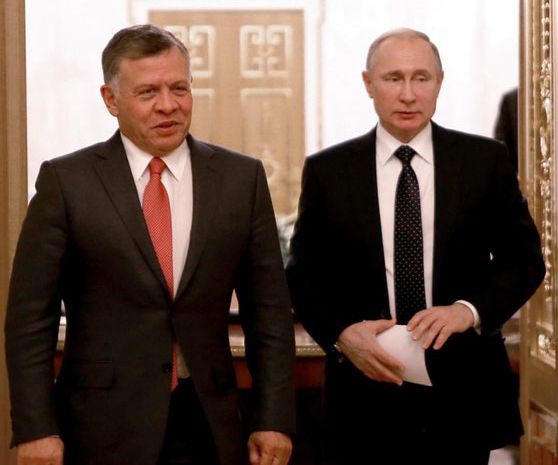 While US representatives are going to Middle Eastern countries to discuss American concerns, the region’s leaders are visiting Russia. In the space of about two weeks, Russia has hosted Israeli Prime Minister Benjamin Netanyahu, Palestinian President Mahmoud Abbas and Jordan’s King Abdullah. Russian President Vladimir Putin also spoke on the phone with Saudi King Salman.
While US representatives are going to Middle Eastern countries to discuss American concerns, the region’s leaders are visiting Russia. In the space of about two weeks, Russia has hosted Israeli Prime Minister Benjamin Netanyahu, Palestinian President Mahmoud Abbas and Jordan’s King Abdullah. Russian President Vladimir Putin also spoke on the phone with Saudi King Salman.
Netanyahu failed to persuade Putin about anything regarding Iran’s presence in Syria, in the wake of Israeli airstrikes against Iranian and Syrian military facilities. Abbas arrived in Moscow on Tuesday for talks on Jerusalem and a settlement of the Israeli-Palestinian conflict. “From now on, we refuse to cooperate in any form with the US in its status of a mediator, as we stand against its actions,” Abbas told Putin.
The US has lost credibility as a mediator, having obviously taken sides in the conflict, and having threatened and blackmailed the Palestinians, which is unacceptable. Washington will not be happy with a stronger Russian role in settling the conflict, but Moscow will not retreat.
King Abdullah headed to Russia’s capital on Wednesday to boost bilateral ties, after meeting with US Secretary of State Rex Tillerson. It has been about a year since the monarch’s last visit to Russia, and it is his 19th to the country since 2001, making him the most frequent visitor of any head of state.
The king’s current visit is of great importance, because it comes at a time when the Middle East is beset by clashes, including between Syrian and Israeli forces near the Jordanian border, and after US recognition of Jerusalem as Israel’s capital. The king seeks Russian intelligence cooperation to confront terrorism and extremism, and Putin’s personal support on Jerusalem.
Full-scale Moscow-Amman cooperation, based on mutual trust and respect, may bring balance to regional affairs.
– Maria Dubovikova
In the past few days, after the confrontation between Israeli, Syrian and Iranian forces in southwest Syria increased the possibility of direct warfare, it has become clear that if Russia did not intervene to calm tensions, things would have escalated. This could have affected the borders of Jordan, Syria, Israel and Lebanon.
“I do feel that the international community has let down our people, who have paid and shouldered the burden of responsibility of 20 percent of our country of Syrian refugees, of other refugees that have come through,” the king told Russia’s TASS agency on the eve of his visit.
Jordanians’ economic concerns were the impetus behind his visit; he does not want any political or military escalation on the Jordanian-Israeli-Syrian border that may add to his people’s frustration. Any escalation could engulf the whole region in a new, possibly endless, war.
The king wants assurances from Putin on the agreed-upon de-escalation zones, mainly in southern Syria. So he will ask Putin for the removal of Iranian and Hezbollah forces from the Jordanian-Syrian border, and away from the disengagement line in the Golan Heights.
Of all the countries neighboring Syria, Jordan has been the most cautious since the outbreak of the conflict in March 2011. Amman was deeply concerned about the threat of widespread instability and violence. Its response to developments in Syria was driven primarily by concerns about the potential security and political impact of the crisis on the kingdom, not to mention the fact that there are more than 1 million Syrian refugees in Jordan.
King Abdullah discussed with Putin the Israeli-Palestinian peace process in the aftermath of America’s recognition of Jerusalem as Israel’s capital, and its intention to move its embassy there from Tel Aviv. The two-state solution, which the king believes in, is the best solution to the conflict. He wants Putin to work on such a solution, and to keep the issue of Jerusalem until final-status negotiations.
The beneficiaries of any delay in a political solution to the Palestinian issue are extremists on both sides.
Russia and Jordan fully agree on this matter. The king believes that resolving the Palestinian issue requires US-Russian coordination.
Full-scale Russian-Jordanian cooperation, based on mutual trust and respect, may bring balance to regional affairs. Russia’s politics have proven consistent and Jordan is becoming a particularly important regional player, with balanced policies.
Article published in Arab News: http://www.arabnews.com/node/1247946/columns
Russian political stances beyond Western calculations
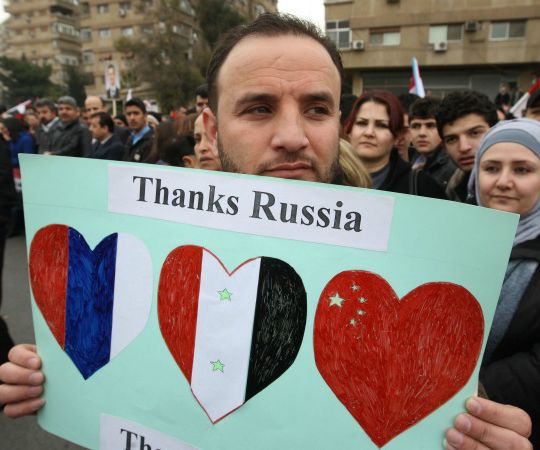 It is hard to believe that Western powers could ever have expected the invitation extended by Moscow to concerned parties to attend the Syrian National Dialogue Congress in the Russian Black Sea resort of Sochi.
It is hard to believe that Western powers could ever have expected the invitation extended by Moscow to concerned parties to attend the Syrian National Dialogue Congress in the Russian Black Sea resort of Sochi.
Sochi has become the hottest topic for Syrians and regional powers, along with the Astana conference and the UN-led Geneva gathering, both of which are of equal importance in the view of Russia.
However, suspicion has marred most Russian attempts to find a political solution to the Syrian conflict. That is, in great part, due to the negative influence of Western media reports on Russia’s role in Syria and the wider Middle East, often accusing Moscow of attempts to destabilize the region.
Even now, the US State Department describes Sochi as “a one-time solution,” and it is close to impossible to predict the outcome of the talks.
More than 1,600 delegates will attend the Sochi congress, each calculating the risks and benefits of this ongoing, multiplayer geopolitical chess game.
That game, of course, includes Turkey’s current military operation in Syria's Afrin — which Turkey has named “Olive Branch.”
Russia, US and other regional players are concerned now with the post-Daesh and Al-Nusra era, and with the threat of global extremism expanding from Syria and Iraq. The Afrin operation prompts all parties to offer a clearer definition of the division of areas of influence and control in Syria in order to implement a realistic plan that goes beyond strategic and idealistic ambitions to determine the future of Syria.
“Operation Olive Branch” could not have been launched without the approval of Russia, which controls Afrin’s airspace. The operation shows how deep the rift between Turkey and its ally, America, has become, as Turkey has effectively engaged in a battle with US-backed Kurdish militias.
Through “Operation Olive Branch,” Turkey is sending a message to the Americans and Russians that it will not allow any threat along its borders. The military action is complicating an already tense and unpredictable situation. Regiments of the Free Syrian Army, who receive military aid from the US but are supportive of Turkey, are now reportedly threatening to combat US forces in Afrin. The more awkward that situation becomes, the more it benefits the Damascus regime and its allies.
Russia — or Vladimir Putin’s Russia as it effectively is now as one man holds the strings of the country’s military and political institutions — is not, as some Western media depict it, “playing both sides.” It is, like all the players in Syria, trying to see how best to serve its national interest, fearing that if the Americans support the Kurds in Syria and play on existing ethnic tensions there, Washington will then use the Kurds to oppose Russian interests in Syria.
Moscow is seizing every opportunity to strengthen its position and role in the Middle East.
– Maria Dubovikova
Russia’s alliance with the Syrian state and the Syrian army is strategic; Moscow will do its utmost to deny any country any influence on this relationship.
In politics, there are no ethics, no honesty and no sincerity; just interests. That is true of all countries in Syria.
Paul Ryan, the speaker of the US House of Representatives, recently said that the US and Russia currently “perhaps” share “tactical symmetry for a convenient moment, but not a strategic alliance.”
What Ryan meant is that Washington and Russia have very different aims in Syria. America’s goal, simply, is to finish off Daesh and retain alliances with other militias in order to combat Iranian influence in Syria. He made that clear when he later added: “What matters most to us in Syria is defeating (Daesh) and preventing Iran from having a land bridge and Hezbollah a foothold.”
Tension between Ankara and Washington has escalated in the past few days: Turkey has threatened to extend “Operation Olive Branch” as far as Manbij, which is located north of Aleppo and lies between Afrin and the Kurdish autonomous region, home to a regiment of American soldiers advising the Syrian Democratic Front (SDF). US President Donald Trump’s call with Turkish President Recep Tayyip Erdogan did little to calm the situation.
Trump warned Erdogan of the “growing risk of conflict” between the two nations and reportedly promised to stop supporting the Kurds. Once given, the promise was almost immediately broken. Besides, it seems neither promise nor threat will dissuade Turkey from its course in Afrin.
This plays into Russia’s hands. Russia is seizing every opportunity to strengthen its position and role in the region. Russian tactics permit Moscow to stay above controversies in which Washington and even Turkey have become embroiled, enabling Russia to take the initiative in a number of activities in Syria.
The Afrin issue, then, could shape Syria’s future and the future of Turkish-American relations.
Article published in Arab News: http://www.arabnews.com/node/1234711
Afrin battle further complicates Syrian conflict
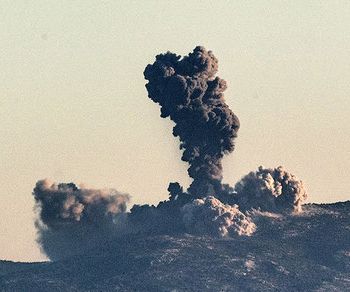 The Turkish military operation in Afrin in northwestern Syria has started, and future military operations are likely in Manbij and as far as the borders of Iraq as Turkey strives to expel the Kurdish People’s Protection Units (YPG). President Recep Tayyip Erdogan considers this organization to actually be the banned Kurdistan Workers' Party (PKK), regardless of the name it is given by the Americans.
The Turkish military operation in Afrin in northwestern Syria has started, and future military operations are likely in Manbij and as far as the borders of Iraq as Turkey strives to expel the Kurdish People’s Protection Units (YPG). President Recep Tayyip Erdogan considers this organization to actually be the banned Kurdistan Workers' Party (PKK), regardless of the name it is given by the Americans.
Following the US announcement that it would form a border force of 30,000 fighters led by the Kurds — which was swiftly retracted — Turkey accused Washington of trying to protect the Kurdish people in order to divide Syria. Ankara viewed this number of fighters, which were to be led by the US-backed Syrian Democratic Forces, as an existential threat to its security and stability and a step toward a future Kurdish state.
Russia temporarily benefited from the US-Turkey conflict over the Kurds, as it had from the differences between Ankara and Moscow over the Syrian government, when Russia continued supporting the regime while Turkey backed the opposition. After the downing of the Russian jet fighter in 2015, Russia successfully used the Kurdish card against Erdogan to acquire more political concessions.
There are two likely scenarios for the war in Afrin and the rest of the Syrian territory that the Turkish army is eyeing up: The first is a large-scale operation aimed at undermining the Kurdish control of Afrin. This would be similar to Operation Euphrates Shield in terms of preparation, assault and the participation of several departments of the Turkish army, as well as Free Syrian Army fighters.
The second is a limited operation aimed at taking certain areas from the hands of the PKK in order to keep its fighters away from the Turkish border. This requires isolating the Kurds, cutting their communication with the eastern cantons and preventing them from accessing the Mediterranean.
International players are making their final moves on the country’s chessboard as Turkey aims to oust US-backed Kurdish fighters from northwestern region.
– Maria Dubovikova
There are many challenges facing the proposed Turkish plan. The first is the difference in Afrin’s terrain from the areas taken during Euphrates Shield, making this campaign more difficult and complicated. Moreover, Ankara is not satisfied with the long-term positions of Moscow and Washington. Ultimately this is a Turkish battle — or rather a battle for Turkey itself — but it will also affect the course of events in Syria.
The Russian Defense Ministry said on Saturday that US “provocations” are a key factor that have complicated the situation in northwestern Syria and prompted Turkey to launch its military operation in Afrin. Russia labeled the US as irresponsible and said its actions would pose a threat to the peace process in Syria.
The Kurds blame Russia for betraying them, but they were trying to milk two cows at once as their relationship with the US threatened Russian interests and its project for the stabilization of Syria. US policies towards the Kurds are also a direct threat to Turkish national interests, with Kurdish separatism a cause of deep concern in Ankara. Additionally, Kurdish ambitions, fueled by the US, have become a threat to the integrity of Syria and the process of reconciliation. Thus Moscow found itself on the same side as Ankara. Before the Afrin operation, Russia and Syria both expressed their concerns, but now it is clear that the move was silently approved by Damascus and Moscow from the beginning.
On Tuesday evening, Vladimir Putin spoke on the phone with Erdogan to discuss the situation. The sides expressed a solidarity and common vision, vowing to continue working to resolve the crisis based on the principles of preservation of territorial integrity and respect for the sovereignty of Syria.
The situation in Afrin is changing not only the regional framework, but also the global one. The move by Turkey — a NATO member with close ties to Western nations — against a group backed, equipped and financially supported by the US takes them a huge step away from their former allies. This demonstrates Ankara's independence and alters their former path towards integration with the West. The ongoing situation will bring Moscow and Ankara closer to each other, pushing them to forge a more solid alliance. The West is unlikely to be able to stop Turkey from realizing its plans in the region, as any confrontation would definitely not play into their hands.
Despite claims the assault on Afrin may harm Syria, Turkey insists its operation is limited and will not affect the integrity of its neighboring country. However, the numerous interventions from various regional and international players have complicated the political and military scene in Syria after a glimmer of hope had started to appear at the end of a long, dark tunnel. The international players are now making their final moves on the Syrian chessboard ahead of any peace talks aimed at discussing a political settlement, draft constitution and interim government.
Article published in Arab News: http://www.arabnews.com/node/1232356
What is in 2018’s Pandora's box?
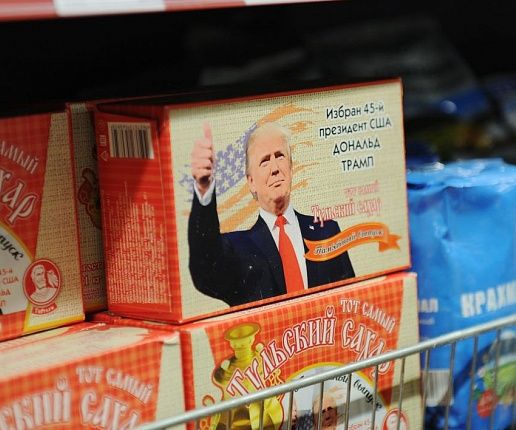 Hardly ever the international community has been looking in the new year with more anxiety than ever in the past decades. Challenges are growing. The ways to counter them are stagnating getting irrelevant to the changing realities. The West living in the imaginary world it got created in its perceptions to serve certain domestic problems is keeping a blind eye on the real dramas that are ready to break out on the streets of its cities. The logic of the international relations is collapsing to realpolitik while the major powers are struggling for their status: Some are striving to keep the status quo of «plural unipolarity», others are going for multipolarity with several dominant powers, setting the limits to the US influence and expansion.
Hardly ever the international community has been looking in the new year with more anxiety than ever in the past decades. Challenges are growing. The ways to counter them are stagnating getting irrelevant to the changing realities. The West living in the imaginary world it got created in its perceptions to serve certain domestic problems is keeping a blind eye on the real dramas that are ready to break out on the streets of its cities. The logic of the international relations is collapsing to realpolitik while the major powers are struggling for their status: Some are striving to keep the status quo of «plural unipolarity», others are going for multipolarity with several dominant powers, setting the limits to the US influence and expansion.
So what to wait from the stormy 2018?
Before proceeding with expectations it has to be clarified that developments of 2018 will be mostly predetermined by the movements of the US which will echo with the reactions and counteractions of the players of the global stage, shaping the agenda for the international community and geopolitical climate map for the whole year.
The US with Donald Trump, unlike the president’s expectations, will not meet support for the American international initiatives and policies, facing more and more discordance and counteraction. Trump having get used to manage business is trying to apply the business models to the global stage, which do not work in global politics. Not everything can be bought and not everything can be sold. With Trump administration, it has become quite clear that the last months of 2017, the US Aid and other forms of US «assistance» programs are considered by the White House as a way of «purchasing» and managing national policies of certain states. This approach is perceived as humiliating and unacceptable. Since the announcement of the decision of Washington on Jerusalem, and vote in the UN and pursuant comments from the US administration there was no space left to illusions.
Promises to «take names»of countries which have voted against the American decision to recognize Jerusalem as capital of Israel and that the US has made very huge contributions to the UN over the past years reflects that Washington combines business with politics. Trump’s threatening words that he would withhold billions of dollars in aid for countries that voted against the US, saying “Let them vote against us; we’ll save a lot. We don’t care.” All of those threats did not work, but clearly unveiled the new strategy of the US on the world stage and its international approaches.
Not surprisingly King Abdullah II of Jordan during one of the recent meetings, gave a strong indirect message to the «countries» expecting to rule Jordan from out through the mechanism of financial aid, saying that Jordan will not bargain its political will and its inalienable rights in Jerusalem as a custodian of Christian and Muslim sites under any pressure by any power. «If any country would extend assistance to Jordan with 1 hundred billion dollars in exchange of Jordanian political concessions, we will decline this offer,» the king said.
But clearly the US will continue to take the course to rule the world through money, trying to buy or to sue those who reject its will through cutting the financial aid and with no doubt using the weak points of those countries fueling deconstructive forces in these states.
The world will get more unstable, especially taking into account new National Security Strategy «NSS» that can already be named the most awkward and worrisome one in history. The new NSS is provoking the two major powers of the East - namely Russia and China - on counteractions and growing mistrust. Taking into account that China is changing its foreign policy, getting from the regional power with global business ambitions to the global power with concrete geopolitical ambitions, the clash of the US-China relations will rise, creating new lines of tensions on the global map. Russia will continue strengthening its ties with China, Turkey, Iran following the US policies, forming an axe of counteraction, uniting around them those, opposing Washington. The US further steps may be considered as aggressive, as sanction policies, as this would ignite hostile reactions of other countries and will further deteriorate the political atmosphere.
Following the same new American policy the Middle East will find itself on the brink of extreme challenges, that may change the regional map and regional balance of powers with declines of ones and emergence of new ones. The process will start the upcoming year with open date of its final shaping. Will the USA enable certain actors to play more active role in the Middle East region?
If the game of war between the two super powers with the involvement of China, France and the UK continues in the region with terrorist activities on the rise that means 2018 will witness too much chaos that is promising to last for many years to come as the war on terrorism cannot be ceased when one party decides to end this political game but rather it is a game where two major powers have their say together to put an end to such a risk to humanity. Afghanistan, becoming new Mecca for the terrorists fleeing Iraq and Syria, will heat up collapsing in the battles of the rivaling terrorist groups. Situation in Afghanistan will influence the climate in the whole Central Asia that will face further fast radicalization of the local population, that will have really dramatic consequences for Russia and other neighboring countries in the short and mid-term perspective.
International terrorism will get new tactics and techniques. The «Lone Wolves» are likely to strike everywhere in the world, mainly in the West whom the terrorist consider as easy targets due to the great number of immigrants and proven failure of multiculturalism and integration policies along with malfunction of countering terrorist acts. The challenge to be faced is that the «lone wolf» terrorism is mostly impossible to be traced and countered. They may act wherever they are with minimum of instruments. Cars, buses, trucks have already proven to be «perfect killers» in the hands of terrorists. The new terrorist - this «lone wolf» is more targeted to sow panic and make people feel unsafe wherever they are rather than on numerous casualties.
Terrorism is benefiting from the rivalry of the great powers, as it can be properly countered only through inclusive cooperation and elaboration of joint strategy to be implemented globally, of all the powers and all the camps.
Conflict between the US and Russia is in a dangerous state where the contradictions are continuously growing without being discusses and the space left is only for the issues on which the countries have interdependent vital national interests. If this situation remain with no change, the contradictions are risking to gain a critical mass, so that a war will become the only solution. Eruption of the open conflict between the US and Russia is unlikely in 2018, but if the contradictions will continue raising heating up tensions with no detente initiated from both sides, the prognosis of war to erupt for 2019 or 2020 will be more than realistic.
Thus, considering all the trends 2018 will be predictably boiling. Hopefully the international leaders will demonstrate enough sanity to take it away from the dangerous brink through cooperation and dialogue. However it has to be unfortunately admitted that the words «cooperation» and «dialogue» are drastically missing in the lexicon of the current US administration. But hope is that Old Europe will recall itself that it still has its own voice and weight.
Article published in Valdai club: http://valdaiclub.com/a/highlights/what-is-in-2018-s-pandora-s-box/
Photo credit: Sputnik/Yevgeny Kolotev
Russia’s vision for a new Syria to be tested in Sochi
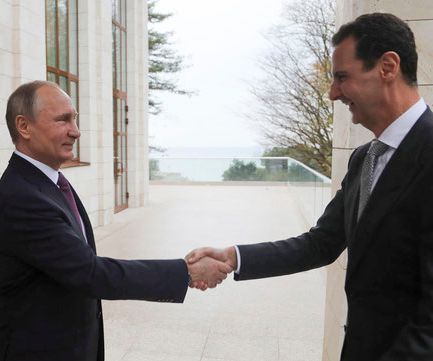 Russia, Turkey and Iran — the guarantors of a cease-fire in Syria — agreed at the end of December to hold the Syrian National Dialogue Congress in the Russian resort of Sochi on Jan. 29 and 30. In their final statement, which was issued last month following the eighth round of Astana talks, the three countries called on representatives of the regime and the opposition to participate in these talks in a bid to end the fighting in Syria and start the reconstruction process.
Russia, Turkey and Iran — the guarantors of a cease-fire in Syria — agreed at the end of December to hold the Syrian National Dialogue Congress in the Russian resort of Sochi on Jan. 29 and 30. In their final statement, which was issued last month following the eighth round of Astana talks, the three countries called on representatives of the regime and the opposition to participate in these talks in a bid to end the fighting in Syria and start the reconstruction process.
The three countries agreed on the list of participants and also agreed to exchange prisoners, detainees and abductees and identify missing persons, Russian sources leaked to the media. After the Sochi meeting, a ninth round of the Astana conference will be held in mid-February.
The dialogue conference is deemed to be very important in the efforts to reach a political solution to the Syrian conflict, as discussions in both Sochi and Astana will be aimed at agreeing on the final process for a solution that will lead to a new constitution, new elections and a new government.
In December, the head of the Kurdish People’s Protection Units (YPG), Sipan Hamo, paid a visit to Moscow and he was informed that the Russians are pushing for Kurdish representation in Sochi, which would lead to a gradual federation of Syria. This, of course, cannot be achieved without the full approval of Turkey. However, Moscow is expected to be a mediator between the Kurds and Turkey. Russian defense and intelligence officials reportedly told Hamo in a private meeting that they were establishing tactical cooperation with Turkey to make Sochi a success, which means that the YPG will not be officially invited, but they will attend.
All components are designed to serve as a model for a future Syria based on geographical federation rather than a single national state, where elections would be held in the presence of US and Russian observers. In spite of the Russian push to achieve a tangible development toward a solution in Syria, the Kurds still receive Western arms, with a Kurdish leader confirming to Russian media that the “Syrian Democratic Forces,” which includes the YPG, received two shipments of American weapons in recent days. “We have a clear military program to raise the number of our forces from 25,000 to 30,000 with a clear change in the People’s Protection Units’ role after the defeat of (Daesh) to become a regular army,” the leader reportedly said, adding that they call on Washington “for a political recognition of the region under the control of the Syrian Democratic Forces.”
The previous Sochi summit between Russian President Vladimir Putin, Turkish Prime Minister Recep Tayyip Erdogan and Iran’s Hassan Rouhani resulted in the three countries agreeing to discuss a list of those who should be invited to the Syrian dialogue conference. This was confirmed at the last Astana meeting, so that representatives of the “three guarantors” would meet to approve a list prepared by Moscow that included some 1,500 Syrians.
Moscow is in a hurry to come up with a solution that would lead to a gradual federation of the civil war-torn country ahead of its own presidential election in March.
– Maria Dubovikova
Moscow’s vision of the dialogue conference in Sochi is to prepare for the launch of the process of drafting a new Syrian constitution by forming a committee of representatives of the Syrian parties.
It appears Moscow is adopting a Russian model of federation for Syria, but Damascus does not view this as acceptable, as what applies to Russia does not necessarily apply to Syria, which is far smaller and less populated. The regime fears that the Kremlin’s view of the political solution for Syria will take too much time to achieve after carrying out the elections, changes to the constitution and giving more power to the prime minister.
The upcoming Sochi meeting is gathering under one ceiling the opposing parties from Syria, including the Kurds — against the will of Ankara and the desire of Tehran. The Russians are in a rush to find a solution because they have a political obligation, which is the presidential election in March.
US Defense Secretary Jim Mattis said at the end of last month that “we have a dividing line” between areas controlled by US allies in eastern Syria and those controlled by Russian-backed government forces in the west, adding that “it would be a mistake to go beyond this line.”
This came in response to Bashar Assad’s words that “anyone who works for the interests of foreigners, especially now under American leadership... against their army and against their people is simply a traitor. This is how we see these groups that work for the Americans.”
Moscow believes that Tehran is pushing for a confrontation between the Syrian Democratic Forces and the regime, with Russian generals telling Syrian Kurds that “other forces are pushing the Syrian government to confront you.” However, the Kurds have now received additional arms and military supplies from the US, which is shifting its role from fighting Daesh to maintaining the land it controls, clouding the issue of Syria’s future even further.
Article published in Arab News: http://www.arabnews.com/node/1220841
Russia ready to fill Middle East void
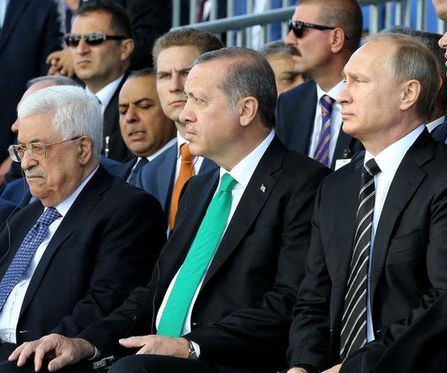 US President Donald Trump, who next month celebrates his first year in office, has formally recognized Jerusalem as the capital of Israel. He has ended decades of American diplomacy by ordering the State Department to prepare for moving the US Embassy to Jerusalem, drawing anger and despair from people and leaders throughout the world, who now expect a possible third uprising in the Occupied Territories, the collapse of Palestinian-Israeli peace efforts, the strengthening of extremists and an effect on the standing of the US in the world, mainly in the Middle East.
US President Donald Trump, who next month celebrates his first year in office, has formally recognized Jerusalem as the capital of Israel. He has ended decades of American diplomacy by ordering the State Department to prepare for moving the US Embassy to Jerusalem, drawing anger and despair from people and leaders throughout the world, who now expect a possible third uprising in the Occupied Territories, the collapse of Palestinian-Israeli peace efforts, the strengthening of extremists and an effect on the standing of the US in the world, mainly in the Middle East.
Trump’s recognition of Jerusalem as Israel’s capital was one of his presidential campaign promises, but hardly anyone imagined it would be among those he kept.
Last week’s announcement turned Washington into a dishonest broker in any future talks between the Palestinians and the Israelis, opening the door wide for Arabs to seek Russian, Chinese and European support.
Though Trump received many warnings from Arab and European leaders and UN Secretary General Antonio Guterres, he insisted on his decision to move the embassy.
The Oslo Accords between the Palestinians and the Israelis, which were signed in 1993 in the White House by former Palestinian leader Yasser Arafat and Israeli Prime Minister Yitzhak Rabin, with the attendance of then-President Bill Clinton, stated that the final status of Jerusalem had to be settled by negotiations.
The dominant majority of the international community has condemned this decision and called on the White House to revise it.
Russia’s Foreign Minister Sergei Lavrov characterised it as “defying common sense”, while President Vladimir Putin shared his deep concerns. Putin phoned his Turkish counterpart following Trump’s announcement, calling for the Palestinians and Israelis to “hold back” and to renew talks.
Putin had a short trip to the Middle East on Monday, paying an unexpected visit to Syria, notably the Khmeimim air base, where he met Bashar Assad and ordered Russian troops’ partial withdrawal from Syria. After that, he held talks with President Abdel Fattah El-Sisi in Egypt and Recep Tayyip Erdogan in Turkey. The issue of Jerusalem and the future of the peace talks were among the important topics that were discussed.
Putin’s surprise visit boosts country’s standing in the region amid fallout from US decision to recognize Jerusalem as Israel’s capital.
– Maria Dubovikova
The current situation gives great opportunities to Russia to strengthen its position in the Arab world. Russia has proved to be an honest peace broker in Israeli-Palestinian talks for years — its position is unbiased and unchangeable. The US manoeuver permits Russia to fill the void, attracting the region’s countries into its network of cooperation.
Putin is seizing these opportunities with his brief Middle Eastern tour. Turkey, which is also gaining power in the region, is becoming a key partner for Russia. After the collapse of their bilateral relations following the downing of a Russian jet on the Syria-Turkey border two years ago, their relationship has been fully restored, and has even reached new levels. At the same time, Turkey is one of the few countries which permits itself to use tough rhetoric against the West, and it expressed in a threatening way its disagreement with the White House’s decision on Jerusalem. Russia stands by the side of President Erdogan and other leaders in the region, thus getting into an advantageous position.
The US is deeply involved in all Arab countries politically, militarily, economically and financially, but it arguably has a track record in sowing instability with notorious regime-change policies. Taking this into account, the Arabs are now grappling with the mistakes they made in previous decades.
The issue of moving the embassy dates back to 1995, when the US Congress passed a bill recognizing Jerusalem as the capital of Israel. But that bill includes an item that allows US presidents to effectively postpone the transfer decision for six months to protect American national security interests. US presidents have been postponing this decision ever since.
Moving the US Embassy to Jerusalem is merely symbolic, but it is an adequate reason for possible further chaos in the Middle East.
Palestinians feel they have been negotiating for peace for more than 20 years and have ended up with zero result. The Israeli-Palestinian peace process ended irreversibly with the US recognition of Jerusalem as the capital of Israel — it is a bizarre decision, but how can the Arab world reverse it?
Middle East vulnerable to being trampled by rival powers
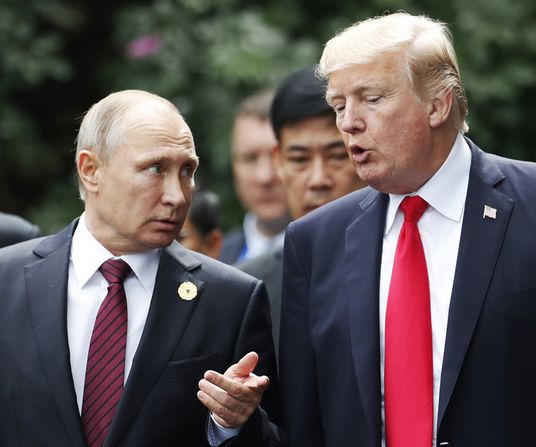 “A Russian wife equals a Russian spy.” This could be a phrase taken from the dialogue of an American Cold War era novel, but actually it is a genuine phrase that was uttered a few days ago at a conference in the US. And this phrase could serve as the perfect illustration of the current status of bilateral relations between the US and Russia.
“A Russian wife equals a Russian spy.” This could be a phrase taken from the dialogue of an American Cold War era novel, but actually it is a genuine phrase that was uttered a few days ago at a conference in the US. And this phrase could serve as the perfect illustration of the current status of bilateral relations between the US and Russia.
Having started to deteriorate in 2014, the relationship between the two major powers is getting worse every year. The sanctions war, diplomatic scandals and media wars have all led to a multi-dimensional confrontation that is getting entirely out of control.
Worsening relations between Russia and the US are being fueled by the media on both sides. However, in the US the media is a bit more successful because it is more effective in influencing people. One can argue though that the current crisis has made ordinary Russians more informed about the US political system than any ordinary American citizen is about Russia’s geographical location.
Russians are interested in knowing about their rivals, while Americans prefer just to demonize and create fear. It is even clear in terms of science. In Russia, there are many experts on American policies and studies of the US are growing, attracting young people. However, American specialists are very few and research on Russia is limited. Thus Russia knows the US well — about its weaknesses, policies and approaches — while Russia remains a big question mark for the US, enveloped by fake perceptions, demonization and deep phobias.
But this is not a new Cold War. All that is happening between the two powers now has nothing to do with a clash between a prosperous democracy and its values against bloody dictatorship, it is not about a clash of ideas and doctrines — it is pure geopolitics.
The Middle East is transforming into the battlefield of Moscow and Washington, as a new world order is emerging amid a struggle of two paradigms: Russian and American. One particular trait of this confrontation is that the result is mostly predetermined not by the capacities of the rival states, but by the choices made by the minor players who are the subject of this confrontation.
Worsening US-Russia relationship is not about a clash of ideas and doctrines like during the Cold War — it is pure geopolitics.
– Maria Dubovikova
American policy toward the Middle East has already left a bloody print on the sand as well as growing chaos and instability. With Donald Trump’s arrival into power, the US position has become unpredictable.
The Russian position on Arab revolutions has not been the subject of widespread public interest, except in the case of Syria. Having abstained on Libya, Russia embarked on a vision that distinguishes between the interests of the Syrian regime in actual reforms and the prevention of Western intervention in the country, which would have disastrous consequences not only for the unity of Syria but also for the stability and security of the region. In Syria, the consequences would be far more disastrous than the West’s mission in Libya.
The US trying to kick Russia out of the region complicates the situation and threatens stability, but America is acting with only one purpose: Not to let Russia take the lead. Thus Syria is turning into a battleground between the Russian bear and the American eagle. The entire Arab region, including Syria’s neighbors, will be affected. It is like the African proverb: “When two elephants fight, it is the grass that suffers most.”
Confrontation between Moscow and Washington makes the world extremely unsafe, but their bilateral ties drastically lack a positive agenda and grounds for a sustainable dialogue. From the deteriorating American-Russian confrontation, only terrorist groups and organizations are benefiting. A recent exchange of classified information between the CIA and their Russian counterparts reportedly helped Russia prevent a terrorist act on its territory, and that raised hopes for a stabilization of ties. However, such positive moves are rare exceptions to the regular rules.
Article published in Arab News: http://www.arabnews.com/node/1211661
Photo credit: Jorge Silva/AP
Dialogue crucial if Yemeni order is to be restored
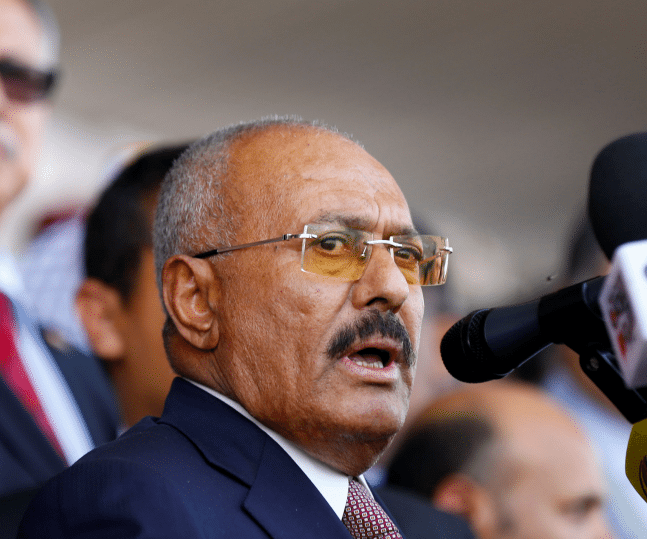 The assassination of former Yemeni President Ali Abdullah Saleh is likely to have tremendous repercussions for the country’s conflict and its future, which is expected to be split in terms of loyalties and political ideologies, aggravating the humanitarian issues. The Yemeni scene is undoubtedly complex and the future cannot be determined with any certainty because of overlapping interests and the fact it is closer to a regional and international conflict than merely an internal one.
The assassination of former Yemeni President Ali Abdullah Saleh is likely to have tremendous repercussions for the country’s conflict and its future, which is expected to be split in terms of loyalties and political ideologies, aggravating the humanitarian issues. The Yemeni scene is undoubtedly complex and the future cannot be determined with any certainty because of overlapping interests and the fact it is closer to a regional and international conflict than merely an internal one.
It is believed that Yemen now needs a person who represents the overwhelming majority of its citizens, regardless of their age and political affiliation, to save the country from further bloodshed.
One should recall that the rift in the Saleh-Houthi axis started a few days before Saleh’s death. Before the assassination, thousands of Houthis and supporters of Saleh gathered in Sanaa, leading to bloody clashes near the Saleh Mosque. The rift and subsequent clashes reveal how fragile political alliances are in the region. No external party can help solve the issue if there is no domestic will to end the conflict and save the lives of the people.
Saleh has left behind a thorny issue that cannot be solved, and no one will be able to bear this very convoluted legacy. He was the president who unified Yemen in 1990, with many wars against the Houthi movement following the killing of Hussein Badreddin Al Houthi in 2004.
During the Arab Spring, which erupted in 2011, Saleh was ousted after 33 years. This led to the war that has destroyed the country’s infrastructure and seen the death toll rise in the past few months. Saleh’s cooperation with the Houthis was a secretive concordat in the beginning, but it was later fully announced. Nevertheless, this coalition was for fake political purposes rather than for true and honest reasons, due to the many contradictions between Saleh and the Houthis in ideology and interests.
A few days before the assassination of Saleh, the Houthis installed billboards on the streets of Sanaa depicting their leader and defending his right to rule the country. Such political moves show a kind of monopoly of power, at least in North Yemen. This led to the recent escalation between Saleh and the Houthis and the exchanges of criticism, with each of the two former allies plotting to eliminate the other at any cost.
Yemen needs a person who represents the overwhelming majority of its citizens, regardless of their age and political affiliation, to save the country from further bloodshed.
Maria Dubovikova
With the death of Saleh, Yemen will be the new battleground of regional and international powers, turning the whole country into a fireball or a new frontier. The Bab Al-Mandab Strait’s importance as the southern gate to the Red Sea has substantial importance in the new world order, which seeks natural resources from Africa. Yemen is regarded as a confrontation field between the superpowers, who strive to set up and then promote their military manifestation and power.
It is difficult to envisage how events will unfold in the coming weeks, as the crisis has already dragged on for nearly three years. No one could have ever imagined the Houthis would ambush Saleh until his mission was over.
No one knows how this recent rapprochement between Saleh and the Arab coalition came about, nor the conditions of their pact. However, Saleh gambled his political career and his life by agreeing on a “political divorce” from the Houthis. It is recognized that the last-minute deal between Saleh and the Arab coalition overturned the balance of power and this switching of allegiances led to the Houthis’ decision to liquidate him at any price, putting an end to his political activities and to his manoeuvers to restore his political party’s power. It appears now that his move was too late.
For Russia, it is important to see Yemen as stable and in peace. The Russian government wants to see Yemenis having dialogue without any external influence on decision-making. Moscow is very much concerned about who will take the help of the General People’s Congress, who will keep the party intact and who will open channels of communication with other parties and with the government of President Abed Rabbo Mansour Hadi. As Yemenis were shocked by the killing of Saleh, the Russian government is hoping that Yemenis manage to tackle this issue to start a new phase and restore peace.
The Houthis may have primarily gained the most from Saleh’s assassination; however, this might not be accurate as many developments could happen at any time and loyalties may change, leading to a rising scale of hostility toward the Houthis.
Article published in Arab News: http://www.arabnews.com/node/1205421











